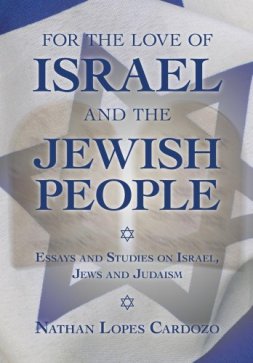By Nathan Lopes Cardozo
Throughout the centuries, historians, philosophers and anthropologists have struggled with the concept called “Israel” more than with nearly any other idea.
While attempting to place Israel within the confines of conventional history, they experienced constant academic and philosophical frustration. Any definitions they suggested eventually broke down due to significant inconsistencies.
Was Israel a nation, a religion, or an altogether mysterious entity that would forever remain unexplainable? By some, it was seen less as a nation and more as a religion; others believed the reverse to be true. And then there were those who claimed that it did not fall into either of these categories.
In fact, it was clear to everyone that “Israel” did not fit into any specific framework or known scheme. It resisted all historical concepts and generalities.
Its uniqueness thwarted people’s natural desire for a definition, which can be alarming and terribly disturbing.
This fact became even more obvious once Titus the Roman forced the Jews out of their country, and specifically after the collapse of the Bar Kochba rebellion.
It was then that the Jew was hurled into the abyss of the nations of the world, and has since been confronted with a new condition: ongoing insecurity.
While mankind has always faced moments of insecurity, it is the Jews who have been denied even the smallest share of the dubious security that others possess. Whether Jews were aware of it or not, they always lived on ground that could, at any moment, give way beneath their feet.
In 1948, Israel once again became a country – but many forgot that it was not only a country. All the other dimensions, such as nationhood, religion, mystery, insecurity and lack of definition continued to exist. The people of Israel today do not find themselves exclusively in the Land of Israel, and instead of one Israel, the world now has two.
Yet the second, new Israel has until now been seen as responding to the demands of history, geography, politics and journalism. One knows where it is; at least, one thinks one does. But it becomes increasingly clear that this new and definable Israel has already become as much a puzzling and perplexing entity as the old Israel always was.
Throughout its short history, the State of Israel has experienced the most inexplicable events modern man has ever seen. After an exile of nearly 2,000 years, during which the old Israel was able to survive against all historical odds, it returned to its homeland. There it found itself surrounded by a massive Arab population that was and is incapable of making peace with the idea that this small and peculiar nation lives among them. After having suffered a Holocaust in which it lost six million of its members, it was not permitted to live a life of tranquility on its tiny piece of land. Once again, the Jew was denied the right to feel at home in his own country.
Continue reading “Will Our Boys Fight Again?”
